How to Build an “Amazon for Alcohol”
Following Drizly’s Success
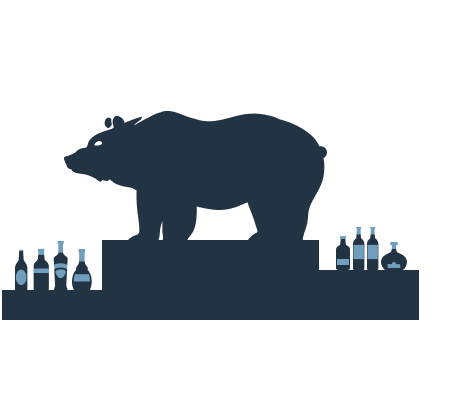
How to Build an “Amazon for Alcohol”
Following Drizly’s Success
Alcoholic beverages are one of the ways in which we relax and spend time with others, whether it’s for a birthday celebration, or a public holiday, or something else entirely. Business executives enjoy a whiskey after making a deal. A young couple in love sits on the terrace, drinking red wine and talking about the future. A group of old friends share a round of beers during a reunion. Sounds nice, right? Naturally, selling alcohol is a lucrative business. In 2017, the revenue brought by alcoholic beverages in the U.S. totaled approximately $71.69 billion. Are you thirsty? Below, we explore the challenges you may face, as well as the opportunities you have to become a leader in the alcohol market. So, let’s discover how to start a liquor business together!
Table of Contents
ToggleThe sale of alcoholic beverages continues to see growth every year. The top 10 European countries for alcohol consumption see people consume between 2.64 to 3.96 gallons per capita. Just in 2016, the total consumption of alcohol in the United States was 2.35 gallons per capita. The demand for alcohol generates worldwide supply, especially among the younger generations.
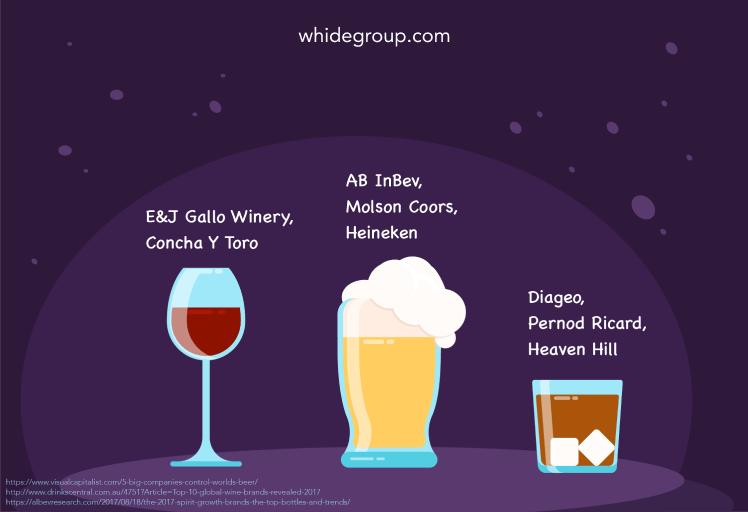
All of the above-mentioned brands have online distributors, which significantly boosts their income. Despite some legal restrictions (we’ll talk more about that later), they have chosen the most fruitful route. A clever marketing strategy (virtual tours and videos, smart ad campaigns), along with steady distribution, and the availability of broadened purchase channels, such as gas stations and convenience stores, and online outlets, have all tied together to promote internal, as well as external demand growth.
We’re currently seeing a trend of brand upgrades, and the emergence of new products and new flavors, all of which breed the same external demand growth. These trends also illustrate the high competition of alcohol goods on the international market and the huge profits to be made in the sphere.
Despite conventional wisdom that the major consumers of alcoholic beverages are Generation X, this opinion is far from the truth. The main buyers are actually Millennials or Generation Y. Thanks to their advanced tech skills, quick lifestyle, captivation with smartphones and the internet, selling alcohol online grows daily. Reportedly, more than 85% of adults have used alcohol during their lifetime.
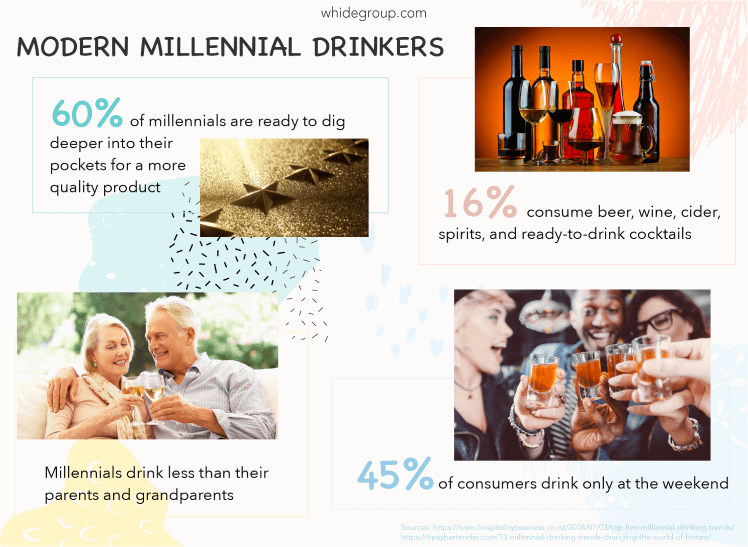
Thus, the modern global alcohol market is changing according to Millennial and Gen X demands.
Most food & beverage products are still purchased at brick-and-mortar supermarkets. However, thanks to delivery processes becoming more tech-savvy, the purchase of food & beverages online has been on the rise.
When ordering groceries online, for example, customers can also add a bottle of red wine for a romantic dinner, spirits for an exciting party, or a pack of beer for a friendly get-together. It is simply a matter of convenience.
Interestingly, there are alcohol delivery websites that have fared well ahead of their offline competitors, thanks to the implementation of highly successful marketing and selling strategies, and an alcohol delivery business plan. They can offer almost any kind of wine, spirits, or beer, sweetened by free home delivery (usually with a price minimum) and delivery to remote places, as well as special offers for the next purchase, and many other beneficial services.
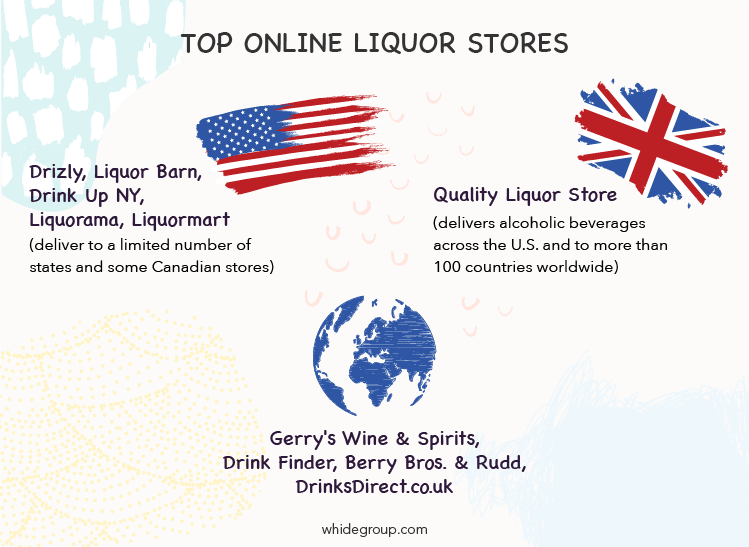
Looking back at those popular alcohol brands, we can say for sure that they meet customer demands & needs. Here are three of the most important market demands for selling alcohol online:
Customers are becoming more and more demanding, and if they want to be successful, producers’ outputs must be focused on pleasing their buyers’ tastes. Our research shows that consumers tend to buy prosecco and sparkling wine, non-alcoholic wine, boutique drinks, craft spirits (rum, gin, and vodka), blended drinks, low-calorie, low-carb, gluten-free and lactose-free beverages.
One by one, we see many brands fail, with no profits for their business. How and why does it happen? Customers quickly change their preferences and desires. One day they love pomegranate wine, the next week the competitor announces the release of raspberry wine, and customers love that instead. These changes force producers to constantly transform their brands.
The wide variety of alcoholic beverages can overwhelm some consumers. The problem? The overabundance of brands competing with each other can make knowing what to choose quite difficult for customers. This is where both mass and social media come to the rescue by promoting a certain product.
Next time the market veers in another direction, and customer behavior changes, a sharp entrepreneur will lead them on their journey. A brand’s power lies not only within its high-quality product but also within a smart marketing strategy and efficient distribution.
Despite the huge profits produced by online alcohol sales, the industry remains unconquered. What discourages business owners from maintaining their own ecommerce channels with online liquor store development? Here are some of the reasons:
Another obstacle in the way of business owners wishing to make an online alcohol store is the three-tier system regarding alcohol distribution. Let’s look into it below.
Despite some industry obstacles, we can see a trending growth in online alcohol sales. This is thanks to third-party companies with short-time liquor delivery, in which the customers simply order their alcoholic beverages just using their smartphones or laptops.
Second only after Amazon in alcohol distribution in the U.S., Drizly covers virtually all of the alcoholic beverage industry. The past several years have seen the brand become a leader in the sale and delivery of alcohol. Drizly allows its customers to order products via their website or on a smart app, and promises delivery within 40 minutes. So, these guys have something to answer the question of how to make money selling alcohol.
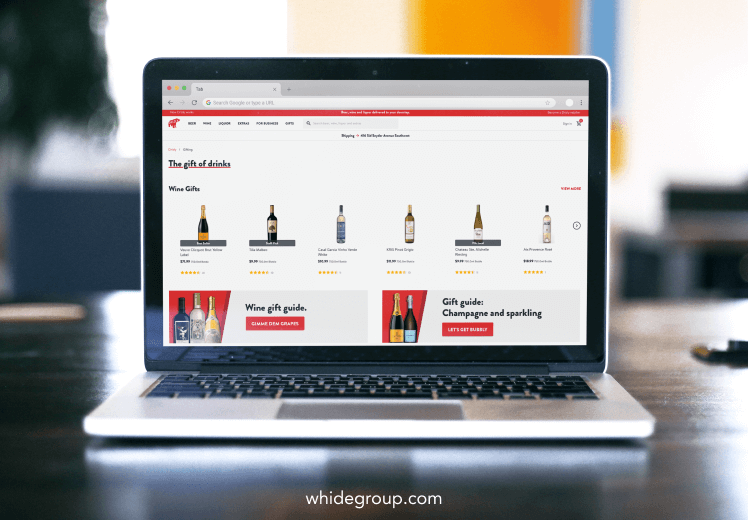
This alcohol marketplace delivers alcohol goods from retailers, without breaking delivery laws and while complying with local sales tax. The company is present in 30 states, and over 95 cities across the U.S. Drizly even operates in Canada, and has deals in place with more than 3% of alcohol retailers in the market.
Hailed as the “Uber for Alcohol”, Drizly strives to be a true marketplace connector. It has almost endless opportunities for customers to purchase what they want. They simply enter their city, state, and street address to find stores available in their location, then choose the beverages they want, add a tip for the driver if they desire, and proceed to checkout. They will be notified when their order is on the way, and can look forward to enjoying a glass of wine or bottle of beer within the hour.
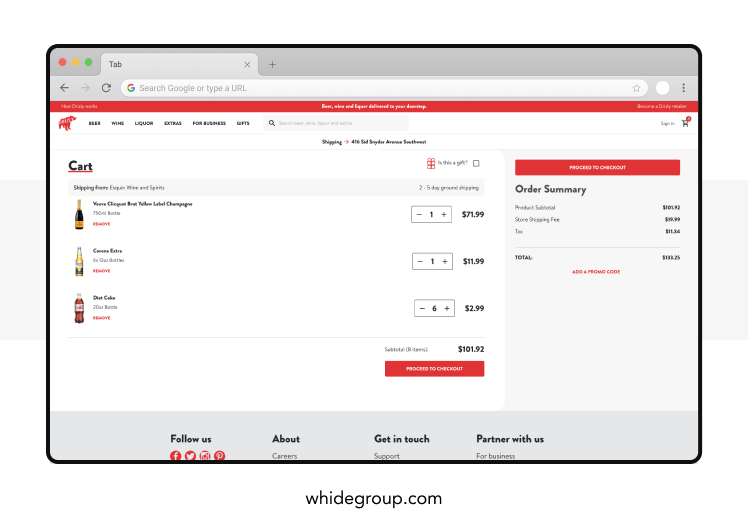
As you can see, the process is quite easy. But, what is interesting is that Drizly neither takes part in the order delivery, nor in packaging the goods. Drizly just sends your order to its retail partners – the near-to-you shops or stores you’ve chosen during your ordering. It is these retailers that actually fulfill the orders.
What is more, Drizly doesn’t charge interest on the transaction. The company makes money by applying a $5 delivery fee to each order and a monthly license fee from its retail partners.
In the UK, a person over 18 can buy alcohol. While teenagers over 16 can drink, it applies only if they are eating a meal together with adults. However, in the U.S., we see a significant difference in the law and the minimum legal age to buy alcohol is 21.
How does Drizly verify age and why is it impossible for the customer to cheat the delivery man? After making a purchase, the buyer must sign an acknowledgement and go through an age verification process. The drivers who deliver the orders, use Mident, a proprietary ID verification mobile app. It allows the driver to scan the customer’s ID and if the verification doesn’t match, the driver has the right to refuse delivery. All data and GPS location is kept in the app.
It only makes sense that in order to stay in the game, Drizly uses this smart age verification process, thus allowing it to preclude alcohol delivery to minors and keep its hands clean at the same time.
Though Drizly stands on top when it comes to selling alcohol online in the U.S., (with claimed revenue around $2.2 million!), this company is not the only ecommerce alcohol marketplace in the world. Here are other examples of ecommerce stores specializing in alcohol, for your inspiration:
Launched in 2013 with a focus on small, independent craft drink producers, this UK company has become a huge craft alcohol marketplace bringing unique products from the producer directly to a customer. For the individual wanting a bottle of wine from a local vineyard, or a few packs of beer from a local brewer to impress at a party, EeBria.com is the site for retail products.
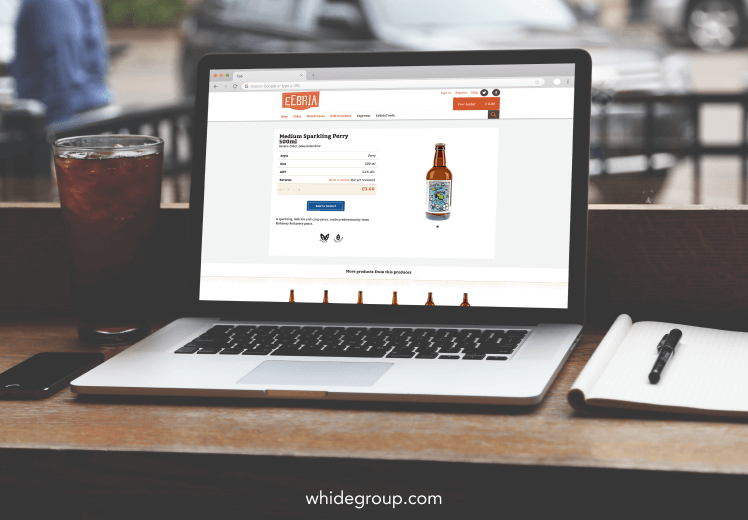
Additionally, for restaurants, stores, bars, and pubs, EeBria created its own trade platform, EeBriaTrade.com, where they sell bottles, kegs, cask, and cans around the UK. This kind of access means that pubs in remote areas can have the same variety of goods as pubs in the City Centre.
Another of EeBria’s advantages is the low commission fee on every sale due to absence of warehouses and associated costs. It’s enough to cover the expenses that the company has, like the packaging, customer, service, age verification through deliverers, and payment processing.
This brand rocked onto the alcoholic beverage market in 2007 and became a famous craft brewery in the UK at once. Selling craft beer online only in the UK, they began easily winning consumers over. They have even expanded production internationally, and have built their own channels in the U.S. Known for its strange public shows, aggressive digital marketing strategy, top-notch liquor store design, this Scottish craft beer brand has already conquered 60 beer markets, worldwide.
BrewDog is pretty much the only beer company that stands out in this crowded marketplace. Their motto “Beer for punks”, bright colors, grungy designs, and a truly memorable logo, have lured their audience in. BrewDog is the greatest example of how a step-by-step design, combined with patient effort, pays off.
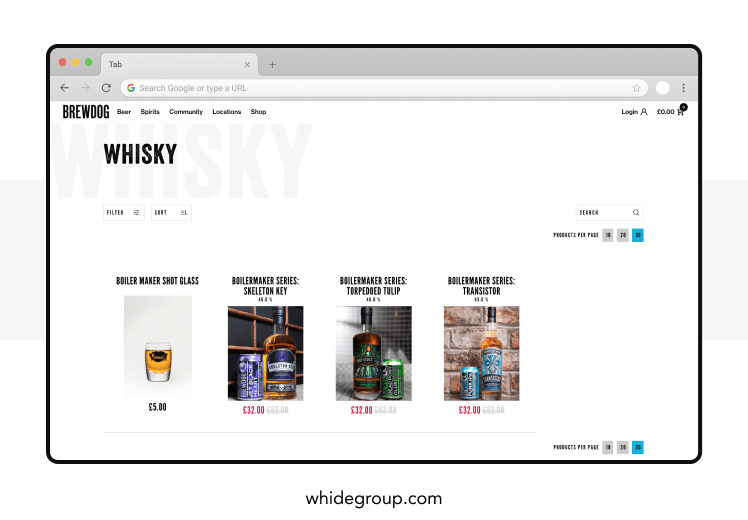
Where else can you find an alcoholic beverage company that has its own popular TV show? “Brew Dogs” follows two Scottish brewers traveling worldwide and shining the light on some of the secrets to brewing. After the show was cancelled, BrewDog’s co-founders created an SVOD (streaming video on demand) service called The BrewDog Network (where you can find the 14-show series of the “Brew Dogs” TV show reincarnated).
So, we saw an additional two successful ecommerce alcohol marketplaces that can surely inspire you to create your own ecommerce alcohol store.These companies underwent a struggle, but found their way to the top. Due to their smart business strategy EeBria and BrewDog made their way into the mainstream.
Upon becoming the legal drinking age, this young, tech-savvy generation expects to buy alcohol online, via their smartphones with a few easy taps or clicks. Customers prefer to buy more online than in a brick-and-mortar liquor store. So, what should companies do? What strategies should they follow? Here are some of the ways alcohol brands can tap into ecommerce:
Keep a pulse check on the market and stay ahead of the game by tracking the marketing and business strategies of your competitors. You should also look to define trends, create promotions, and welcome the new arrivals to the global alcoholic beverages market. Also, pay special attention to both positive and negative customer critiques of products.
One of the ways to step into ecommerce and boost sales is to get closer to your customers and leave them feeling warm and snug. Try implementing an experiential marketing strategy that sees your brand’s interaction with consumers in a real world situation. Try to demonstrate and promote your product using any branding material you have! For some examples, consider the Ghostbusters movie promotion, Volkswagen’s “Take a Slide”, or Mountain Dew’s UK ‘guerrilla tour’.
Don’t forget about digital branding strategy. By operating online, you can enhance your chances to be seen and gain popularity. The name of your brand can fly from mouth to mouth. It’s a straightforward way to find new buyers and markets. Using customer relationship management (CRM), you can readily expand your customer base and get the necessary insight into every single customer preference.
How can you sell alcohol on Amazon? Just sign up to Amazon Prime! Currently, Amazon is considered the best way to distribute alcohol among many markets in the US. As for Drizly – they rely on their wholesaler partners in distribution. Learn their strategy and make some variants suitable for your niche and region. Track events that happen in the European, Japanese, Chinese, and other alcoholic beverage markets.
One of the greatest ways to tap into ecommerce is to build strong, friendly relationships with meal delivery services, restaurants and cafes. It gives your business a huge opportunity to boost sales and extend your client base.
Above, we discovered business and marketing ecommerce strategies you can implement into your project. However, robust strategies alone cannot help you become successful. You also need an appropriate website that will demonstrate your niche. Now, let’s dive into advice on how to build an online liquor store.
Depending on your business requirements, you have to choose the right CMS. If you want to only sell craft beer or wine, for instance, there is no need for a complex platform. Create an alcohol website using easy-to-manage ecommerce platforms, e.g. WooCommerce or BigCommerce. However, if your goal is to sell a wide range of products from multiple vendors (beer, wine, hard spirits, etc.), the sensible decision is to build a website using more complex systems, e.g. Magento or Shopify.
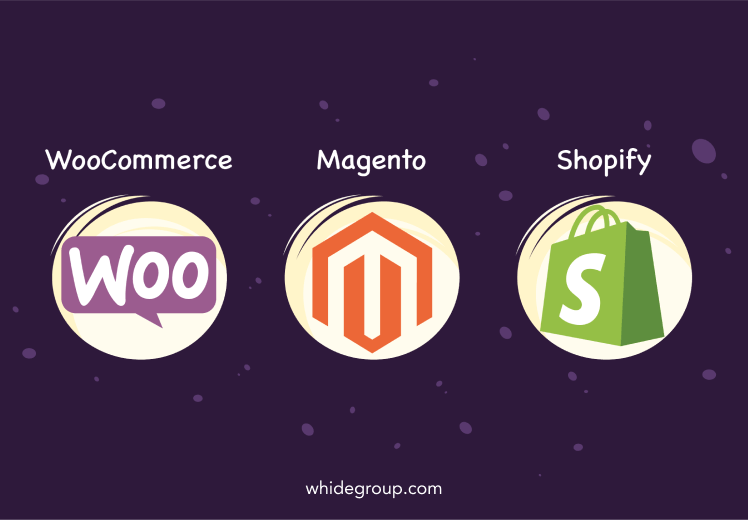
We all know the law regarding the legal drinking age, and a breach of the law means unpleasant legal consequences. While it’s hard to track whether a minor has violated the law by entering the wrong age, you must still implement age verification plugins into the site. They are quickly installed, website responsive, and have no influence on the site performance.
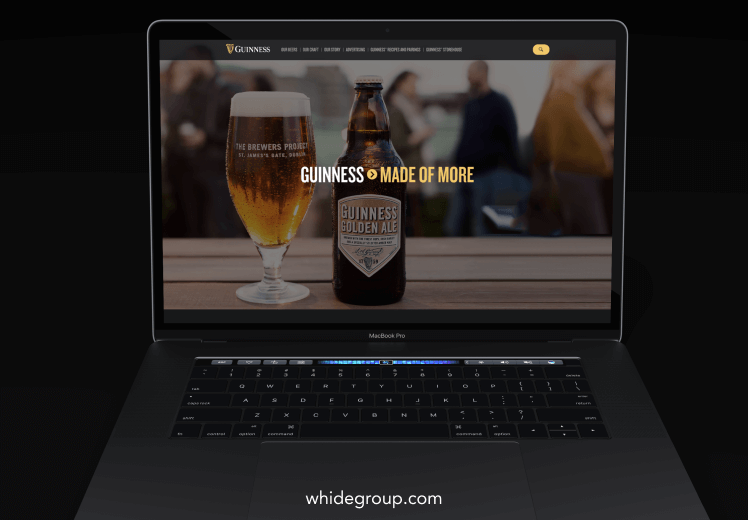
Traditional horizontal navigation is used by the majority of ecommerce websites. However, with today’s mobile device popularity and tall screens, horizontal navigation becomes a bit uncomfortable for the user. To iron this issue out, you can use vertical navigation instead and make the customer journey easier and more comfortable. Another suggestion is if you have more than 7 categories, add some white space between the blocks for clarity. You can also use a show/hide menu to save space and architecture.
There can be hundreds, even thousands of alcoholic beverages at your store. Imagine your customer wants to find “Pinot Blanc”. They’ll first have to find the “Wine” category, then navigate to “White Wine”, then click “more” and only then does their desired drink finally appear. However, a search bar with an autosuggestion function helps customers shorten their journey. People shop online mainly for the convenience, so anything you can do to make the process easier for your customers will be a positive contribution.
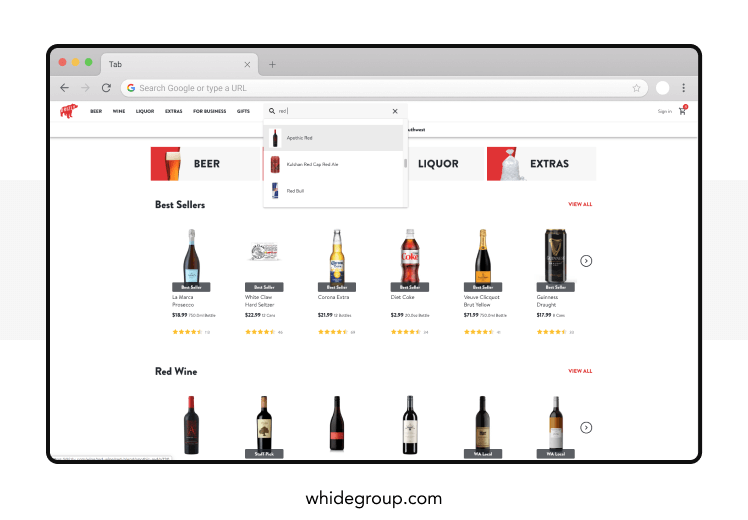
Providing custom search is crucial in the alcohol industry. Everyone has their own taste, budget, and drink preferences. Thanks to customization and sorting, users can get ahead of their shopping, especially when they might otherwise be at a loss as to what to order for a party or wedding, for example. It helps to create sorting by categories, such as best-selling products, price, brand, country of origin, etc.
We always want to search for the best – best price, best pizza, best drink, best everything! Make this easy for your customers. Providing product comparison capability allows your customers to choose the best option among multiple products. Your task is to provide a list of comparable features- similarities and differences, strengths and weaknesses. Naturally, you’ll have to thoroughly learn about the products you sell in order to be able to discuss and recommend them properly.
As you may know, one of the most effective ways to boost sales is to display the best-selling products on your homepage. If they have ratings, that’s even better! Such conspicuous placement immediately catches the customer’s attention. It’s best if customers can see the best sellers without having to scroll down. You can use titles such as: “Top Picks”, “Trending Now”, “Best Sellers”, “Current Top Sellers” etc.
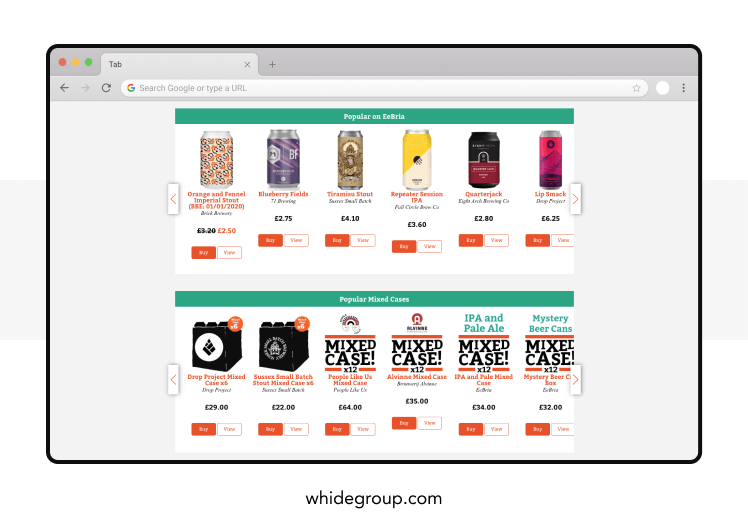
Alcohol beverage choice can sometimes be complicated, especially when you are not an alcohol expert. Let’s say you have a customer whose task for today is to surprise friends with impressive wine or to present a decent bottle of whiskey to a business partner. Help them along with this must-have feature: testimonials from experts & customer reviews. By providing this simple aspect on your website, your customers will feel confident in their choices, and grow to trust your business brand more.
Alcohol ecommerce business can be categorized as a high-risk merchant, since it requires age verification, deals with a lot of fraud and chargebacks, and is so highly regulated by laws for selling alcohol online. We’ve got a solution: a high-risk payment provider implementation. There are several options available like PayKings, SecurionPay, and Twispay, just to name a few. These companies work with high-risk businesses and can find the payment options that are most suitable for you. Additionally, don’t forget the traditional payments gateways like PayPal, Visa, MasterCard, Discover, etc.
Good design is like a refrigerator — when it works, no one notices, but when it doesn’t, it sure stinks.Irene Au
No one argues with the fact that great website design not only gives pleasure but also makes customers feel comfortable. A well-structured site that boasts the right color scheme, has only necessary elements and sensible navigation, and lacks any kind of redundancy, is most engaging for potential customers, which naturally contributes to increasing sales. Let’s look further into the main features of an online alcohol store design.
The answer to the question of how to sell alcohol online starts from development clear navigation. You can achieve this through a compelling website layout with a simple sticky header, same-length paragraphs, left-sided visual strategy, related links, and including primary content above-the-fold.
When selling a lot of products, you should categorize them in ways customers can easily find. The best solution for liquor store website design is either using a dropdown or a mega menu with placement at the top of the site or to the left. Clear categorization of your products makes your buyer’s journey simpler, and shoppers love convenience.
Typically, alcohol store homepages have a simple structure and use little space. For example, you want to keep scrolling to a max of 6 times, so your potential customer doesn’t get bored. However, if you’re striving to create the best liquor store design, you have to be careful as making a homepage too short will limit your ability to add important information about sales, and other marketing tools that will help attract customers.
To encourage the customers to purchase alcohol online, you need to hook their attention by engaging them to read or watch. This catch can be achieved through the slider extension or by video implementation. You can also insert dynamic content (text, gif) into your banner image. It enhances the page with flare.
It’s well known that the presence of CTAs raises conversion rates. Indeed, a well-designed CTA button makes you money! Amongst liquor store website design, we typically see large, standout rectangle CTAs in bright colors like red, orange, or green, that read “Shop Now”, “Add to Cart”, or “Join”.
What goes through your head as you purchase, for example, a bottle of red wine online? Does seeing the “you may also like…” prompt, followed by the display of a discounted bottle of delicious white wine from the same producer, interest you in that product? If you’re like most consumers, it will! So, temp your customers in the same way by offering them a deal they can’t refuse.
Don’t underestimate the power of blogging in online liquor stores. They not only help create a strong web presence, with room for SEO, but they also entertain users and serve as instructors on the abundant alcoholic beverage world. With attractive images, useful content, catchy titles, and inviting CTAs, you snag complete customer interest.
Regardless of what you want to sell, if you want to be successful, Drizly’s example illustrates the importance of adapting to the environment and circumstances, and how to take control of a situation and become a leader. If you are ready to make money and want to build an alcohol website that will always be on the tip of your customers’ tongues, ask an experienced development team, like Whidegroup, for help. Let’s make life more interesting!
Share This Article

 Payment Gateway Integration for Your Ecommerce Website
Payment Gateway Integration for Your Ecommerce Website
Drizly impressed me. I ordered Jack Daniel’s single barrel heritage through them, as every other liquor store around me was sold out and it was impossible to obtain. They were the only place I could find to purchase it online (at a fair price), so I took a chance on them, despite some not-so-great reviews. Their price for shipping was a bit high, but I found a coupon to save a bit. Though after receiving the product, I can understand why the shipping cost was so high- they spared no expense to ensure the product arrived safely. Their estimate of 2-5 day shipping was accurate (received on the 5th day) and the care that went into their packaging of the product was admirable. I would order from Drizly again and recommend their services to others.
Much obliged to you for sharing have stunning substance,
creative express gratitude toward you.Thank you for sharing your article. It is truly stunning for me. Keep keeping sharing your blog entry. Much thanks.
hey, Awesome post. keep up sharing this type of blogging tips. I’m new in blogging. And I think this will really help me a lot for my new business field. Thanks for sharing.